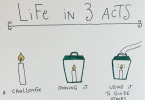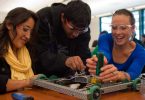By Harriet Worrall-Carter
The skills young people are being taught now, might not even apply in 2030.
A report by the Foundation of Young Australians (FYA) says skills like problem-solving, creative thinking and written communication will be vital in a 2030 workplace.
It also predicted that workers will spend one-third of their hours at work learning new skills. This is because workers will need to respond to new information and constantly evolving technology.
‘Thriving in the New Work Order’ also outlines the importance of preparing young people for a changing workforce.
FYA CEO, Jan Owen, said we should focus on how jobs are changing – not which jobs are disappearing.
“We need to start preparing young people for a future where the way we perform all jobs will change because of automation,” Ms Owen said.
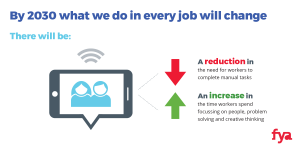
(Image supplied by FYA)
The report analysed over 20 billion hours of work completed by 12 million Australian workers across 400 occupations, in order to predict the skills and capabilities that will matter most in 2030.
The average Australian will spend 3 hours less per week carrying out manual tasks such as operating an assembly line, stacking shelves and cleaning.
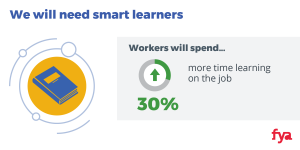
(Image supplied by FYA)
FYA question whether the current interpretation of what makes someone ‘smart’ – making the least mistakes and have the highest achievements in formal learning – will change with an increased reliance on technology.
“The way our education system currently measures and understands what it means to be work smart will not equip them with the required skills or to become lifelong learners,” said Ms Owens.
The report predicts our interpersonal and creative skills will also be more and more valuable.
“Young people will need to not only acquire foundation and technical skills but be able to use these in an increasingly entrepreneurial and creative ways,” said Ms Owens.
The foundation is calling for a “renewed investment in Australia’s young people”, including a redesign of learning systems in schools and higher education.
CASE STUDY 1 – TEACHING
A teacher in 2030 will spend a lot less time marking and more time interacting with their students.
Teachers will also use digital technology to make the classroom more interactive.

(Image supplied)
New software will take over routine tasks like marking with hours spent marking going down from 5 hours a week in 2006, to only 1 hour in 2030.
Alex Blackburn is currently studying a Masters of Secondary teaching, and she believes these changes are already taking place in classrooms.
“Marking is already being cut down through the use of technology,” she said. “When I’ve been in classrooms they are using online resources for testing purposes and marking is done automatically.”
“Virtual reality is also taking a big role in subjects such as science and physical education.”
Alex explains that teachers are spending less time at the front of the classroom lecturing, and getting students to research topics on their own.
“Teacher’s provide students with key topics and web links to help increase their knowledge.”
“They then collate the information and often present or work in groups to discuss their findings,” she said.
“Self-directed learning is an opportunity for students to feel a sense of pride and achievement when they are able to develop an understanding themselves.”
“It motivates them to learn and less pressure comes from the teacher”
CASE STUDY 2 – ACCOUNTING
The report makes it clear that accountants will still need to have mathematical skills, however, they will also need to know how to solve a problem and communicate options to their clients.

(Image supplied)
In 2030 accountants will spend 36 hours a week on written communication (up from 26 hours in 2014) and 22 hours on verbal communication (up from 12 hours in 2014).
Emily Carter plans to study Business and major in Accounting when after she finishes high school this year.
Emily explained that she is excited for the way accounting is heading.
“It’s not as boring as people make it seem. Accounting is stereotyped as a desk job just crunching numbers, but the way it’s heading we will deal with more clients face to face,” she said.
“You still need to be able to understand the process of where those numbers came from, what they’re showing. But then you need to be able to communicate that to your client.”
“You’re taking what can seem very confusing to business owners, and giving them options to work with.”
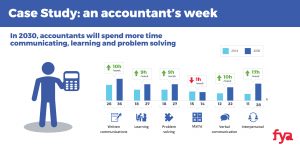
(Image supplied by FYA)
CASE STUDY 3 – SOCIAL WORK
Those in the ‘carer’ industry – GPs, social workers, counsellors etc. – have a high degree of transferable skills, according to the report.

(Image supplied)
Hours spent organising and managing staff will decrease by five and four hours a week respectively.
Carers will use more interpersonal skills, critical thinking and problem-solving.
Jack Heenan is currently studying youth work, minoring in counselling, and is not surprised at the increased emphasis on interpersonal skills.
“The importance of communication in this field is next to none. It is vital.”
“Youth work is a collaborative field, working alongside communities, families, parents, teachers, social workers and psychologists.”
However, Jack believes paperwork is still highly important in the field.
“Young people’s files provide information for the worker to best help engage with the young person and be aware of their triggers, past trauma etc.”




